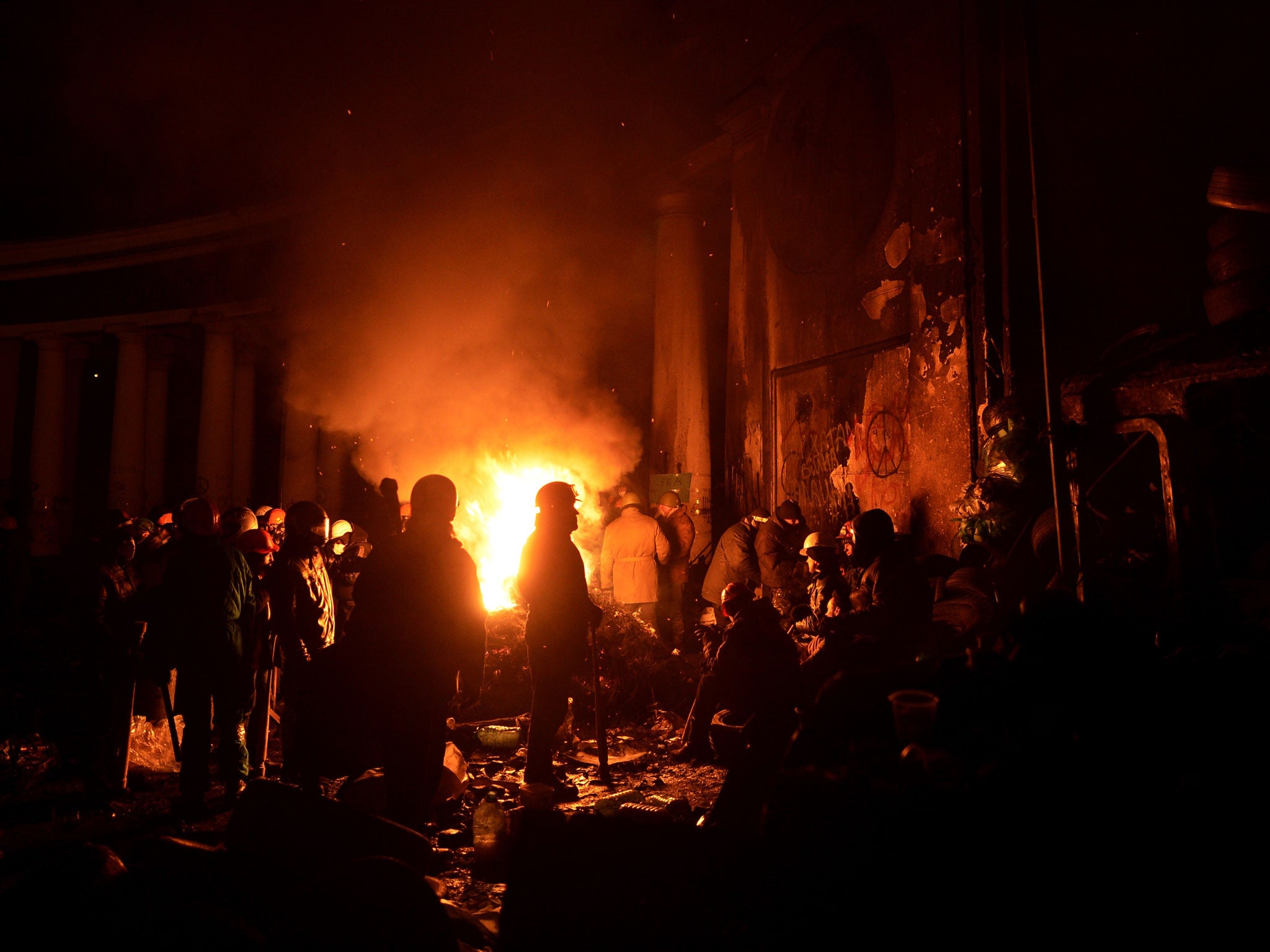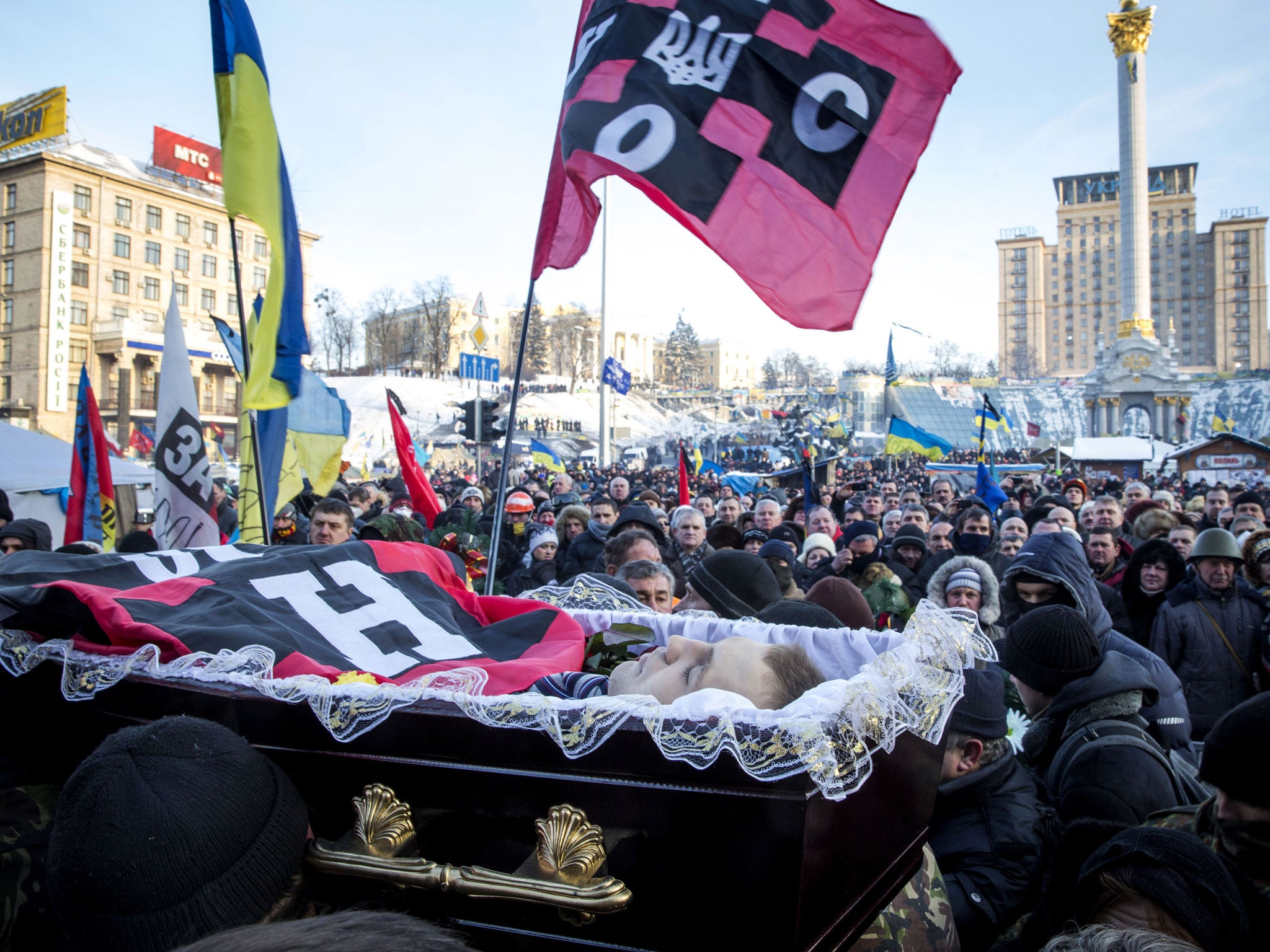Ukraine protests: Police forced to abandon Kiev conference centre to opposition as protests spread further across the country
Protesters claim the newly-occupied Ukrainian House complex had a police sniper post with 'spent cartridges' on the roof

Ukraine’s two-month old anti-government protests have spread further across the country despite offers of concessions from President Viktor Yanukovych.
Thousands of demonstrators attempted to take over the regional government office in Dnipropetrovsk on Sunday, a major industrial hub in eastern Ukraine home to more than one million people and birthplace of opposition leader Yulia Tymoshenko.
Thousands more tried to seize the local government headquarters in the south-eastern city of Zaporizhia, local media reported. Further protests took place in Lviv, Ivano-Frankivsk, Chernivtsi, Lutsk and Sumy over the weekend, raising fears that the previously peaceful movement is morphing into a national uprising.
In Kiev on Sunday, hundreds of protesters chanted “heroes don’t die” as the coffin of one demonstrator shot dead in clashes with police was paraded through the city centre.
The opposition cancelled a mass rally to hold a memorial for 25 year-old Mikhail Zhiznevsky – one of at least three people to have died when protests in the capital turned violent last week.
“We just want to live in a free and peaceful country,” said one protester at the memorial, who gave his name as Vladimir. “This death shows we live under a dictatorship.”
Later, police clashed with protesters in central Kiev
Opposition leaders have so far dismissed surprise concessions, offered by Mr Yankuovych on Saturday in a bid to defuse the political crisis.
Arseniy Yatsenyuk, leader of Ukraine’s largest opposition bloc, was offered the role of Prime Minister and world champion boxer-turned-politician, Vitali Klitschko, who leads Udar, was offered the post of Deputy Prime Minister, in charge of humanitarian affairs.
Addressing protesters in Kiev's Maidan, or Independence Square, on Saturday night, opposition leaders said demonstrations would continue as they maintain demands for early elections and changes to the constitution to limit sweeping presidential powers.

"No deal... we're finishing what we started. The people decide our leaders, not you," Mr Yatsenyuk later tweeted, in a message to Mr Yanukovych.
Demonstrations began in Kiev in November after Mr Yanukovich spurned a political and trade agreement with the EU in favour of closer ties with Russia. The protests turned violent over a week ago, after the government introduced tough new anti-protest laws restricting freedom of expression, movement and assembly, in an attempt to curb the demonstrations.
Early on Sunday morning, demonstrators in the capital Kiev stormed the Ukrainian House convention centre, throwing fireworks and Molotov cocktails at police who had been stationed inside to monitor the mass protests that have engulfed the city centre. Protesters now occupy six buildings in the city, including the city hall and ministry of agriculture.
Russian President Vladimir Putin is due to fly to Brussels tomorrow for talks with EU leaders, where the unrest in Ukraine will almost certainly be discussed. Russia – which regards Ukraine as being firmly within its sphere of influence - has previously warned the EU to stop interfering in Kiev’s affairs.
Russia and the EU have "a number of differences which need to be discussed and clarified" at the summit, European Council leader Herman Van Rompuy said in a statement.
Government insiders in Kiev and Moscow say Mr Yanukovych is under considerable pressure from Mr Putin to crush the demonstrations, which it sees as a threat to its hold over former Soviet states.
“For the Kremlin, Ukraine is Russia,” James Sherr, associate fellow at Chatham House and author of ‘Hard Diplomacy and Soft Coercion: Russia’s Influence Abroad’, told The Independent. “It believes the protests are being orchestrated by the West. If Ukraine were to go its own way, Russia would be amputated.”
The Kremlin rewarded Ukraine’s pivot away from the EU with a $15bn (£9bn) bailout to rebalance its dire finances, but Mr Sherr says it could decide to withhold some of this much-needed aid if Mr Yanukovych fails to restore calm.
Radical elements, such as the far-right group Right Sector, have been blamed for stoking clashes with police. Yet at the huge protest barricades at Hrushevs’koho St over the weekend, several previously peaceful protesters told The Independent they had decided to arm themselves with sticks for protection after instances of police brutality, and in response to the passing of the tough anti-protest laws.
For a few hours on Sunday afternoon, relative calm descended on Kiev for the memorial.
Yula, a 28-year-old social anthropologist who has been coming to the protests since November, believes Mr Yanukovych is “nothing more than a gangster”. She said she protests to continue what she and thousands of others started during the 2004 Orange Revolution.
“I have come for more than politics. This is more than an objection to violence, more than a memorial for the deaths of three people,” she said. “Our system is cracked and it has to change. People are fed up with the dysfunction and corruption that affects more than government – our medical services, our justice system, our education. It has to stop.”
Join our commenting forum
Join thought-provoking conversations, follow other Independent readers and see their replies
Comments
Bookmark popover
Removed from bookmarks